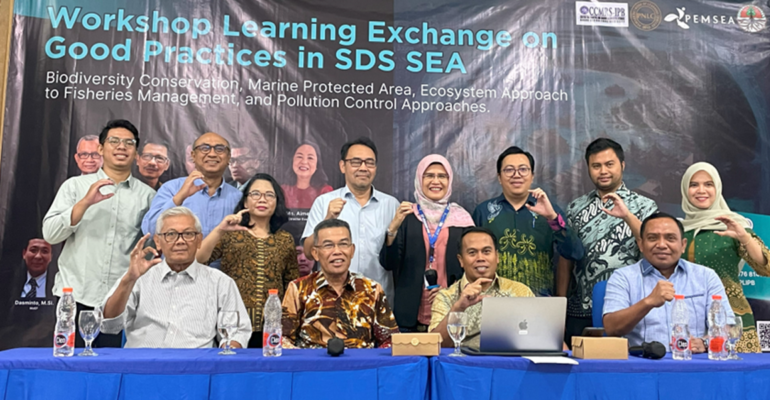PKSPL IPB University Encourages Local Governments in the Implementation of SDS SEA Program

The Center for Coastal and Marine Resources Studies (PKSPL) IPB University held a Learning Exchange Workshop on Good Practices in Sustainability Development Strategies South East Asia (SDS SEA), Thursday (7/12) at the PKSPL EDTC Building, Baranangsiang Campus, Bogor.
This workshop was titled Implementing PEMSEA Program Learning site in Indonesia: Biodiversity Conservation, Marine Protected Areas, Ecosystem Approach to Fisheries Management, and Pollution Control Approaches.
“The role of PKSPL IPB University as a PEMSEA Network Learning Center (PNLC) is to assist PEMSEA Network Local Government (PNLG) in implementing the SDS SEA program at PEMSEA sites in Indonesia. This is aligned with the purpose of the establishment of PNLC since 2015,” said Prof Yonvitner, Head of PKSPL IPB University as well as President of PNLC.
PNLC is a PEMSEA learning center, a higher education institution (HEI) that has institutional capacity and experience in organizing academic programs and other means of capacity building, research and technical consulting services related to sustainable marine and resource management.
“The purpose of PNLC is capacity building, research and technical consulting services related to sustainable management of coastal and marine resources,” explained this Professor of the Department of Aquatic Resources Management (MSP) IPB University.
No less than 100 participants attended both offline and online. Consisting of representatives from the Ministry of Environment and Forestry (KLHK), Ministry of Home Affairs, Ministry of Maritime Affairs and Fisheries, Regional Government Organizations (OPD) from various provinces, districts and cities, the Indonesian Fisheries and Marine Higher Education Leadership Forum (FP2TPKI) and a number of universities.
PNLC Secretariat Coordinator, Isdahartati, MSi revealed, one of the objectives of this workshop is to share experiences in implementing an area-based management approach that focuses on biodiversity, including gaps and challenges and things that need to be improved.
“In addition, it also aims to share developments in mainstreaming various area-based approaches and identify synergies in plans and programs to support SDS SEA implementation targets,” she said.
The PKSPL IPB University researcher added that other objectives of this workshop were to identify opportunities for capacity building and networking, support the PNLG program in achieving relevant SEA SDS Implementation targets, and share success stories of PKSPL IPB University as PNLC in assisting PEMSEA Learning sites in Indonesia.
Aimee Gonzales, Executive Director of PEMSEA on that occasion reviewed the approaches and opportunities for SDS SEA implementation in East Asia. She said, there are at least three priority management programs and three governance programs that need to be carried out.
“Priority management programs include conservation and management of biodiversity, then climate change and disaster risk reduction and management and reduction of pollution and waste management,” said Aimee.
The cross-cutting governance programs include ocean governance and strategic partnerships, knowledge management and capacity building and blue economy investment and sustainable financing. (*/Rz) (IAAS/MKY)



